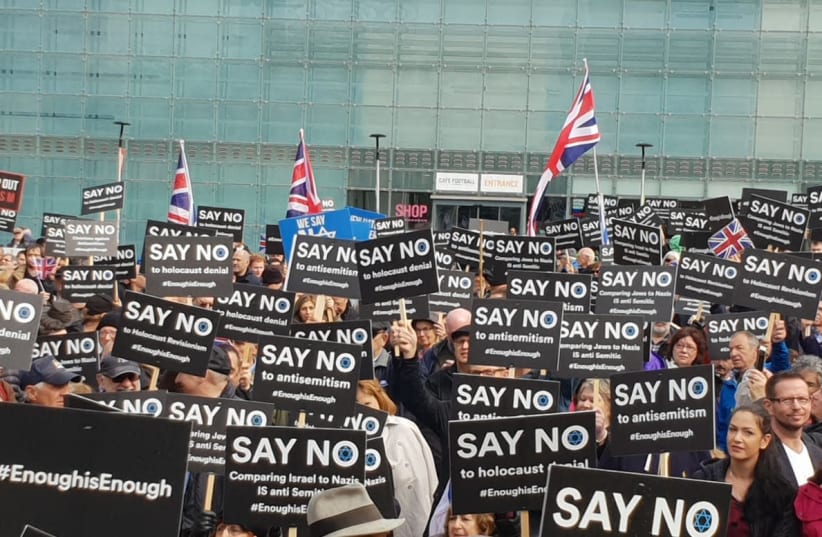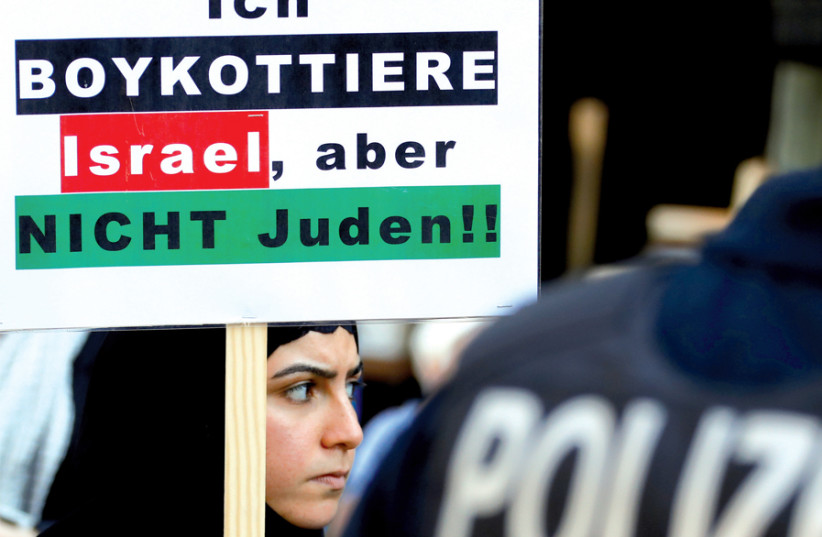A new survey found that roughly one out of every four residents of the European countries polled for the 2023 survey harbored antisemitic attitudes. In Eastern Europe, there were significant drops in the antisemitism index scores in Ukraine (46% to 29%), Poland (48% to 35%), Hungary (42% to 37%) and Russia (31% to 26%). However, overall antisemitic attitudes remain higher in Eastern Europe compared to Western Europe, exceeding one in three respondents in Hungary and Poland.
The ADL (Anti-Defamation League) European survey is the latest installment of The ADL Global 100: An Index of Antisemitism, first conducted in 2014, which is the most extensive poll on global antisemitic attitudes ever conducted, encompassing 102 countries and territories.
These statistics are dramatic because they show that despite some progress being made in reducing antisemitic attitudes in certain countries, antisemitism remains a deeply entrenched problem across Europe. The fact that one in four residents of the European countries polled harbor antisemitic attitudes is a concerning statistic that highlights the need for continued efforts to combat antisemitism.
The new survey found that some of the most stubborn anti-Jewish tropes remain deeply entrenched in 10 European countries. The survey also found that one out of three respondents in six Western European countries believe that Jews are more loyal to Israel than to their home countries. In Spain, one in four people are likely to believe classic antisemitic stereotypes – particularly hateful beliefs about Jews and money and Jews controlling the government.
Consistent with previous surveys, among the six countries polled in Western Europe, Spain remains the country with the highest level of antisemitic attitudes, with 26 percent of the population harboring extensive antisemitic beliefs, followed by Belgium (24 percent), France (17 percent), Germany (12 percent) and the United Kingdom (10 percent). The Netherlands registered the lowest score of the 10 countries polled for the antisemitism index, with just 6 percent of those polled holding antisemitic views.
Antisemitic attitudes more firmly entrenched in Eastern Europe
In Eastern Europe, antisemitic attitudes are even more firmly entrenched. Despite modest declines in each of the four countries polled, there are still high levels of antisemitic beliefs in Hungary (37 percent), Poland (35 percent) and Russia (26 percent).
The largest decline in hateful attitudes toward Jews was recorded in Ukraine, where antisemitic attitudes dropped from a record high of 46 percent in 2019 to 29 percent in 2023, potentially driven in part by the popularity of the Jewish President, Volodymyr Zelensky, whose approval ratings have risen dramatically over the last few years in response to his defiance in the face of Russian military attacks.
“The dramatic improvement in antisemitic attitudes in Ukraine seems linked to the popularity of President Zelensky, a leader who is both proudly Jewish and public about his heritage,” Jonathan Greenblatt, ADL CEO and national director explained in a statement. “While the survey findings do not directly address questions of causality, there’s no doubt that having a Jewish president who is being praised for his response to Russian aggression seems to have affected perceptions of Jews among ordinary Ukrainian citizens,” he concluded.
Other key findings of the European Global 100 Survey include:
- Russia and Spain topped the list of countries with the largest populations believing in classic antisemitic tropes. In Russia, nearly 30 million people out of an adult population of 115 million people harbor classic antisemitic beliefs. In Spain, 10 million people out of an adult population of 39 million people hold antisemitic beliefs.
- In Western Europe, the dual loyalty trope is the most commonly held antisemitic stereotype, with wide swaths of the population believing that Jews are more loyal to Israel than their own country. Well over half of Spaniards (56 percent) believe this statement is “probably true,” as do 46 percent in Belgium, 38 percent in the Netherlands, 37 percent in France, and 34 percent in the U.K.
- In Eastern Europe, the dual loyalty canard is even more prevalent, with 62 percent in Poland agreeing, 48 percent in Hungary, 38 percent in Ukraine and 36 percent in Russia.
- Holocaust awareness is virtually universal across Europe, but Holocaust denial is markedly higher in Eastern Europe. In Hungary and Ukraine, 19 percent of those polled agree with the statement that “the Holocaust is a myth and did not happen,” or say the numbers of Jews who died were “greatly exaggerated.”
In Russia and Poland, those denying the Holocaust were at 17 percent and 15 percent, respectively. Germany and the Netherlands came in lowest for Holocaust denial, at 5 percent and 4 percent, respectively.
- Even in countries where antisemitism was low, belief in harmful stereotypes about Jews was still disturbingly high. In the Netherlands, which had the lowest index score at 6 percent, 18 percent of those polled agree that “Jews have too much power in the business world” and 38 percent believe “Jews are more loyal to Israel than to this country.” The same was true in France, where 28 percent say Jews have too much power in business, and 37 percent believe the dual loyalty trope.
- The survey found that higher concern over right-wing violence correlates with lower levels of antisemitism in Europe. Countries with more concern about far-right violence (France, Germany, the Netherlands, and United Kingdom), tend to have lower antisemitism index scores than countries with less concern about far-right violence (Hungary, Poland, and Spain).
- The poll found most Europeans reject the use of boycott, divestment, and sanctions (BDS) as a tactic to isolate the State of Israel. While many in Western European countries say they sympathize more with Palestinians than Israelis, support for boycotting Israel was extremely low.
For this installment, more than 6,500 adult citizens in Europe were surveyed between Nov. 8, 2022, and Jan. 30, 2023. Among the questions asked of respondents, 11 questions measuring general acceptance of various negative Jewish stereotypes were used to compile an index that has served as a benchmark for ADL polling around the world since 1964. Survey respondents who said at least six out of the 11 statements are “probably true” are considered to harbor extensive antisemitic attitudes.


